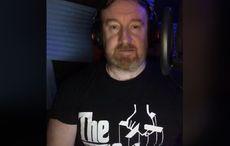North River, Pete Hamill's quietly moving new novel, is a tale about everyday heroism and provides us with a timely reminder of how love reorientates us, restores us to our senses, and enriches our lives. But don't expect cheap sentiment. This is a New York tale after all. CAHIR O'DOHERTY talks to the author.
PETE Hamill's new novel North River (Little, Brown) begins with James Finbar Delaney, an Irish American doctor, being roused from his bed by a Mafia gunman to minister to a bloodstained capo who's just been shot in Little Italy. Not the most obvious beginning for a love story, is it? It's the winter of 1934, the darkest year of the Depression, and outside the snow has become a blizzard. And it turns out that the frigid temperatures and the aftermath of violence aren't the only surprise waiting for him.
On his doorstep when he returns is a two-year-old boy, hurriedly abandoned by own daughter. In this way our hero Delaney first finds himself face to face for the first time with his grandson Carlito and the certain knowledge that he is now responsible for the boys fate.
"It's a love story for grown ups, which means that you don't get hit on the head with a bolt of summer lightening," said Hamill during a recent interview with the Irish Voice.
"It's all about small details, the small awakenings of desires and imaginings. I really believe that we imagine and then we live. And sometimes that gets you in a lot of trouble. But I wanted to show how even in the bleakest of times - if you're open - there's room for love, and of a more substantial kind maybe than the one that came before."
An abandoned foundling on your doorstep is the sort of development that could upend many people's lives, but few characters show the inner fortitude that Hamill's quietly heroic James Delaney displays. It's no accident that the hero of his new novel is a Depression-era doctor, haunted by the sadness of one failed relationship and the thoughtlessness that marked another.
"It's my belief that there are quiet heroes. The doctors of the Depression were like Sisyphus, they knew how to diagnose but they didn't always have the science to cure yet," he says.
"There was no penicillin and no sulfur drugs, and so the famous bedside manner of that era was really one of the major tools they had. They tried to give people consolation to live another day or week or year. It was heroic to roll that same boulder up the hill knowing it's going to come down again. I wanted to celebrate those people. They got me here after all."
Hamill is aware of the many traps that writing frankly about love can lay for a writer. But he's completely unfazed.
"Every time an Irishman writes about love they accuse him of sentimentality, which would be a real surprise to Samuel Beckett or W.B. Yeats," he maintains.
"I wanted to write about love without poisoning the notion with irony. It's about finding grace in your everyday life, about being open to let life change you. The doctor in this book is 48 and is completely changed by a child, who makes him see the world again with innocent eyes."
Hamill's own story is a classic New York tale. A boy is born in Brooklyn in 1935, growing up absorbing the sights and sounds of the teeming city that surrounds him.
He makes friends, he goes to high school and in time he becomes one of the most celebrated journalists in the once again thriving metropolis. There are darker chapters too of course, vividly chronicled in his best-selling memoir A Drinking Life, but over long years, to his great surprise, he achieves and surpasses his own ambitions, and better yet, he clearly enjoys himself in the process. It's an instructive American life, if you have the wit to see it.
Surviving the vicissitudes of life, an enduring theme for Hamill, and living to see a brighter day, are lessons he learned early on. An accident when Hamill's father was a young man resulted in an amputation. That left his mother to take the kids out to see the city (she didn't stint them).
Says Hamill, "She was filled with this amazing sense of wonder about New York. It was a lot bigger than Belfast, where she was from.
"At the time nobody had any money and so she used to take us out on these weekend trips to the city. She had an amazing enjoyment of diversity of the place, of there being people unlike her, which is the glory of New York - that it's filled with people who are not like you. She thought it was literally thrilling, this marvelous place, this Oz. And because she was a Catholic from Belfast, she was determined not to do to anybody what had been done to her."
Meaning discriminate against unjustly. Knowing the history of the Irish in New York, Hamill takes a strong line on the current immigration crisis.
"When I think about it I just can't stand the notion that any Irishman or woman who went through the bulls*** the Irish went through here would turn around and reject anyone else. Some people don't understand that a Mexican woman hurrying off to clean someone else's house is my mother.
"They're here for the same damn reasons and they're doing the worst jobs so their kids won't have to. That's the way it worked for us then, and it's the way it should work right now. It enrages me. The ones who call themselves Christians - do they think Jesus would be patrolling the border facing Mexico to shoot guys named Jesus?"
For Hamill, being both Irish and American, freedom is most fully expressed through generosity to others. It's a lesson he learned young, in a time of deprivation.
What changed things for Hamill and the neighborhood he came from was what he calls "the greatest piece of legislation in my lifetime," the G.I. Bill.
"If an Irish kid came home and said to his parents, 'I want to be a writer or an actor,' they'd look at him and say, 'Who do you think you are?' They were the victims of what I call the green ceiling," Hamill says.
"They were a generation so mauled by the Depression that they didn't want their kids to want what they could not get. Because the deck was stacked, or the doors were closed, or it was a foolish dream or it was better to take the cops test or the fireman's test."
But thanks to the G.I. Bill blue collar America, within just 10 years, had become a completely different place.
Says Hamill, "It meant that the sons of blue collar Irish factory workers or Jewish cab drivers or Italian construction workers could send their sons to university to study Spinoza too."
With their foot finally in the door, they didn't go back to the blue-collar jobs that their fathers had. "What I always say about the Irish is that they won all the late rounds," Hamill feels.
As for readers of his new book, Hamill is typically candid. "I would hope they come away from it thinking that it doesn't add a cent to human lousiness. And I hope that it says that even in the worst times better times are coming.
"I come from those people. They never deluded you that tomorrow would be better, but they suggested that the day after tomorrow might be a hell of a lot better and it turned out to be true. Anything that makes us more human is the stuff of novels."




Comments